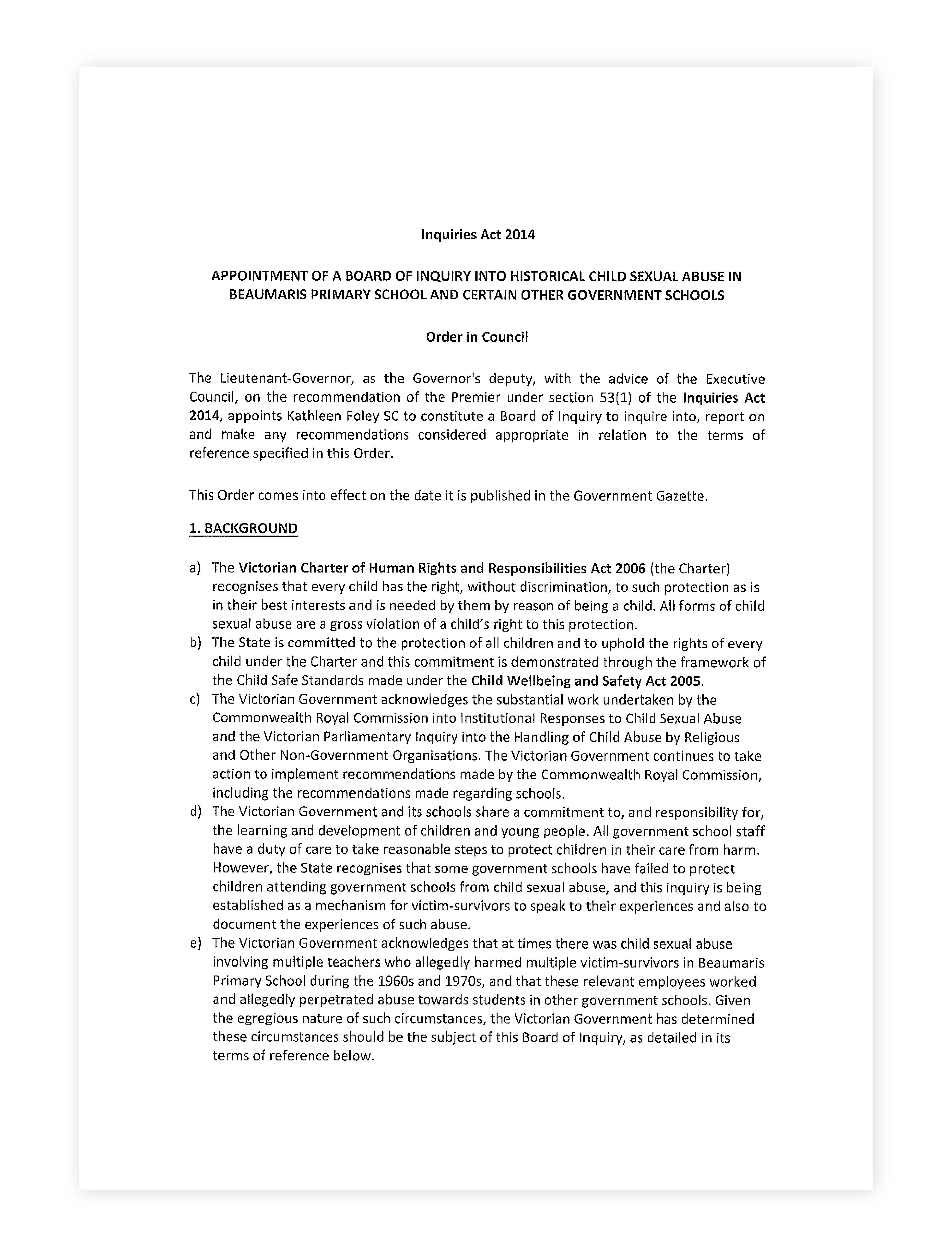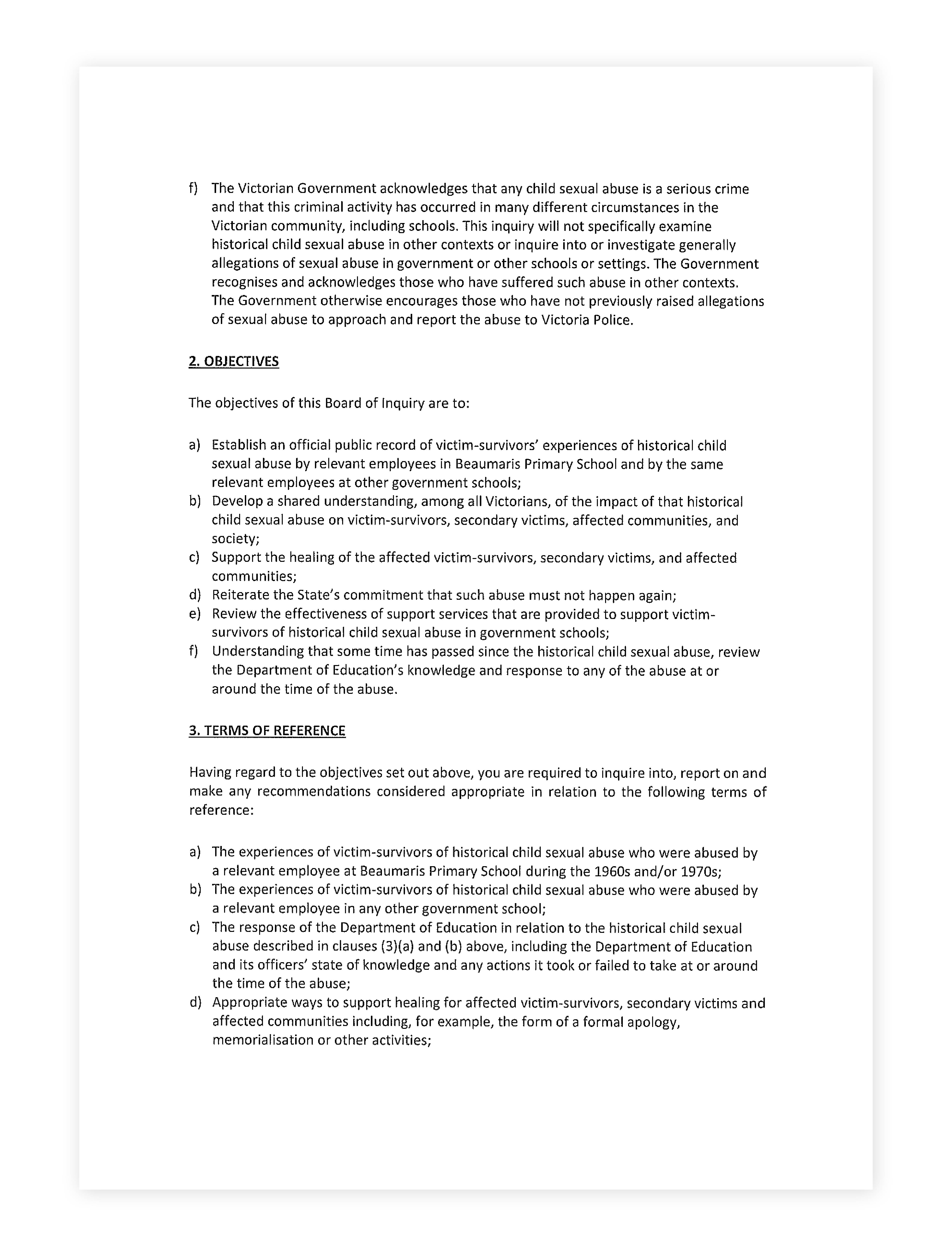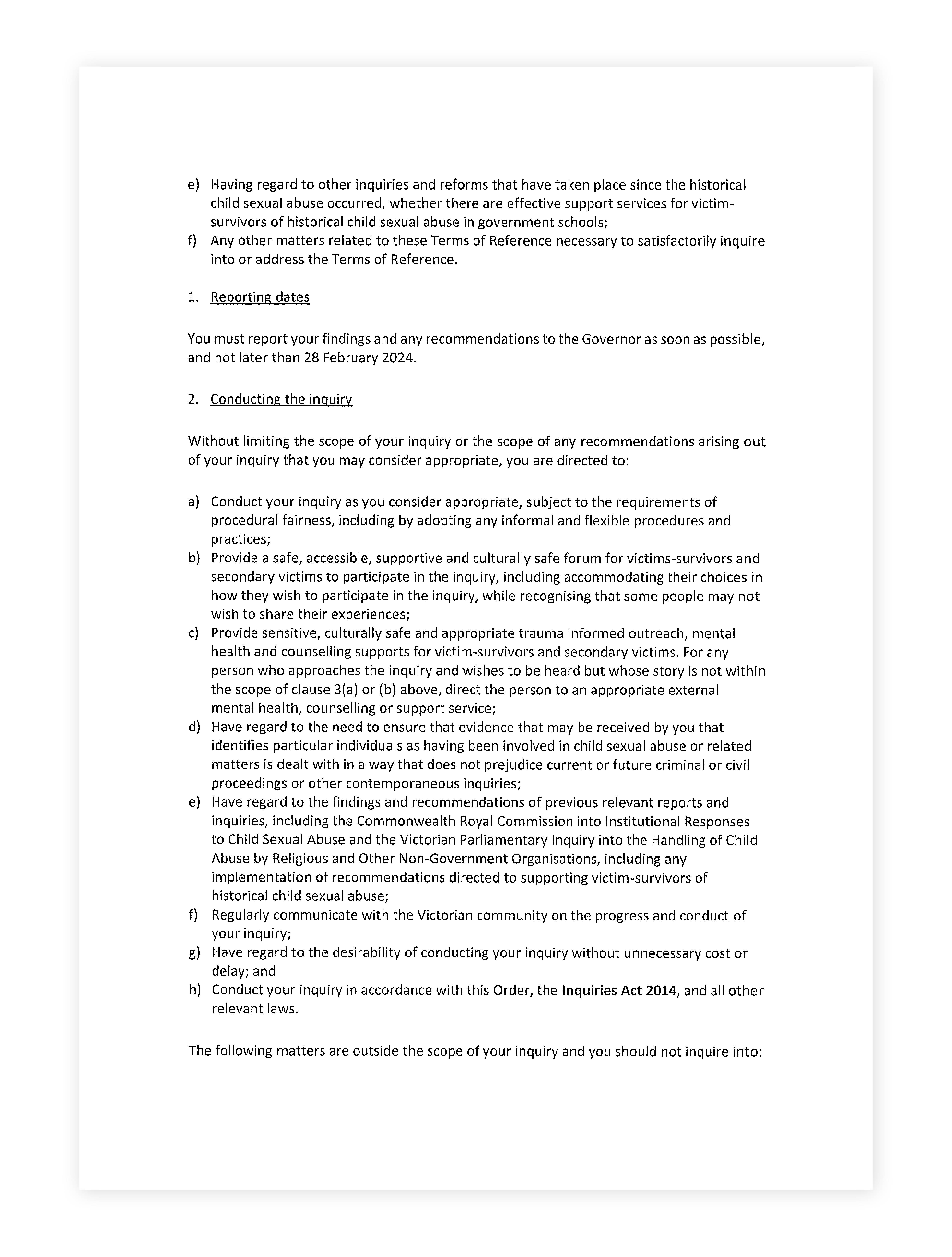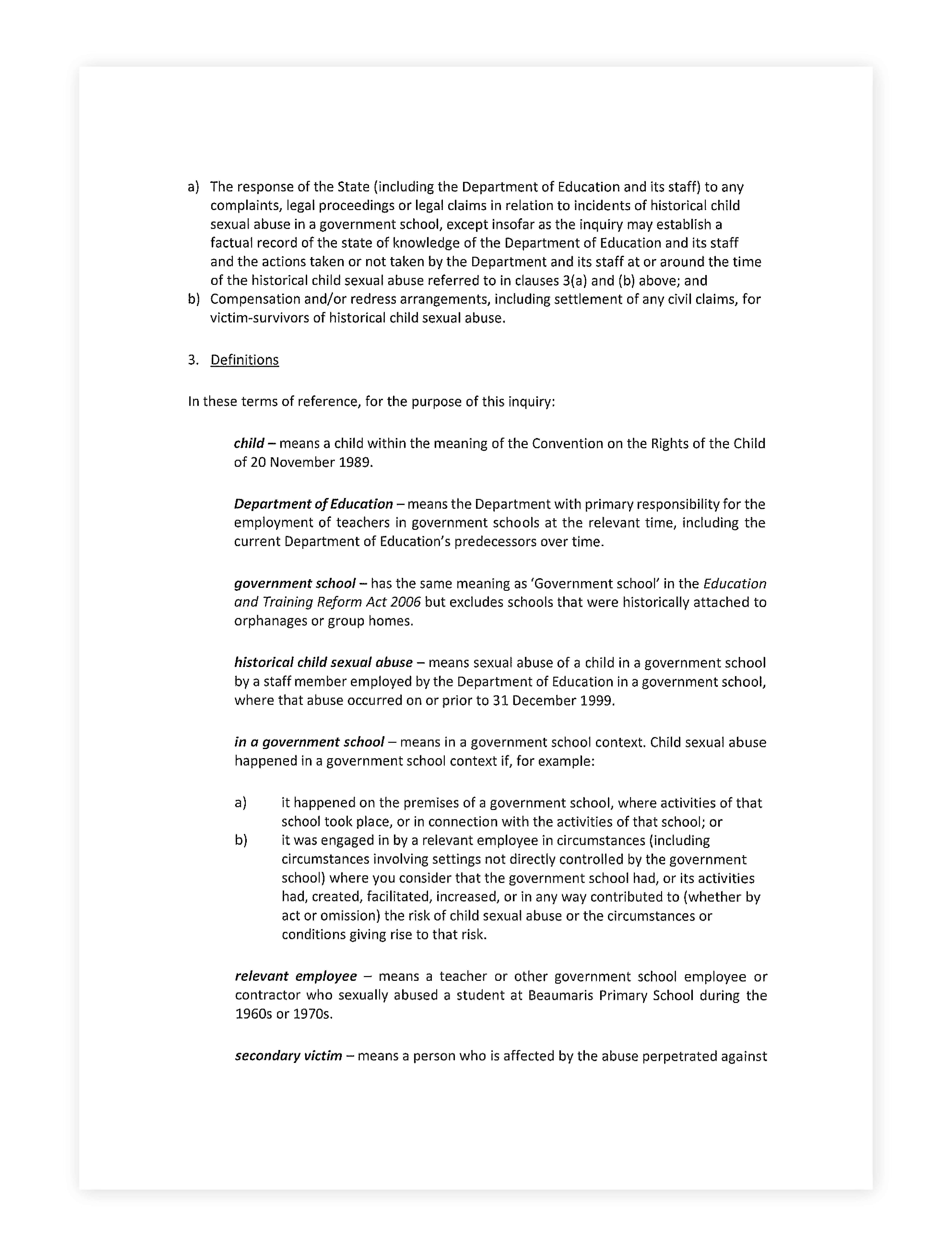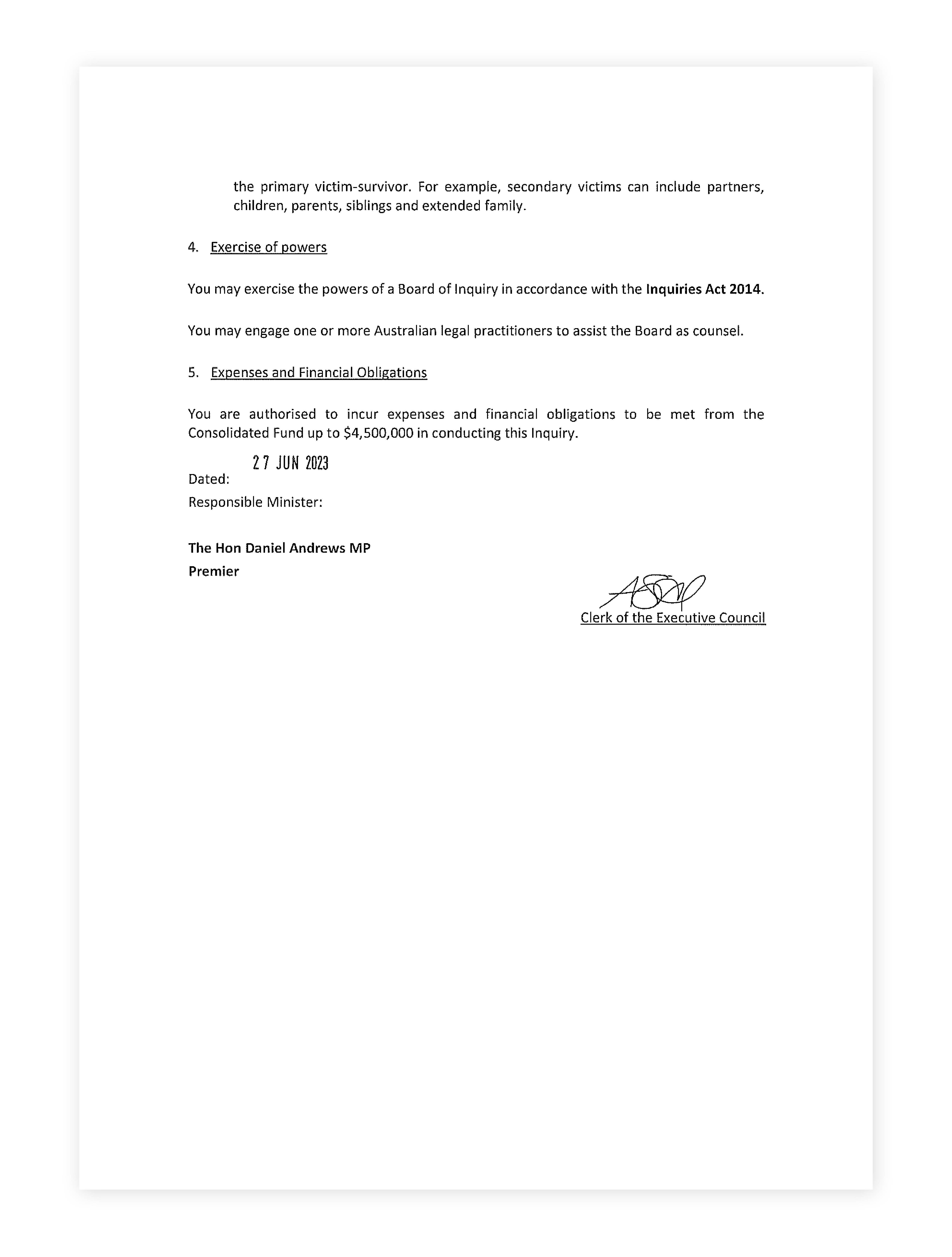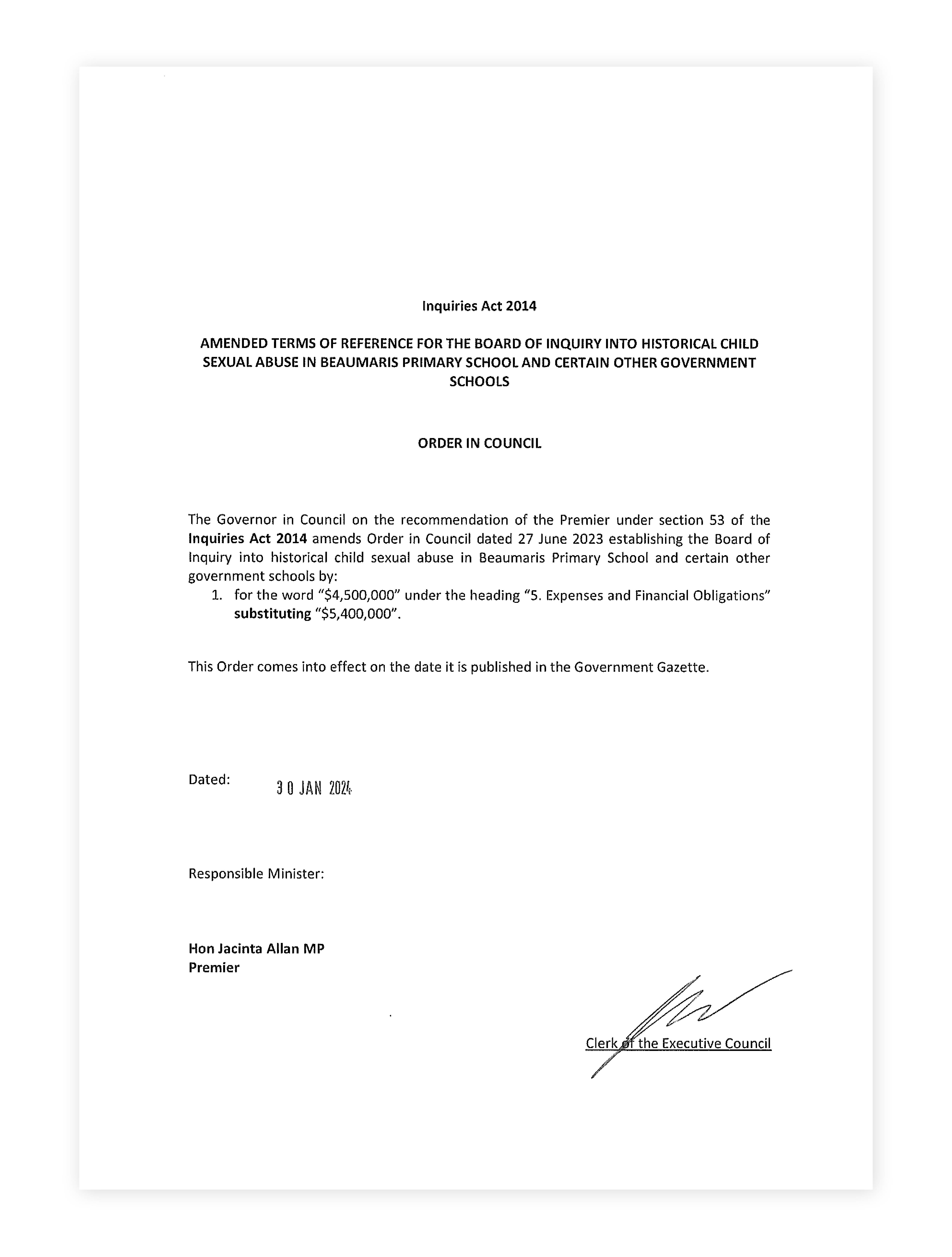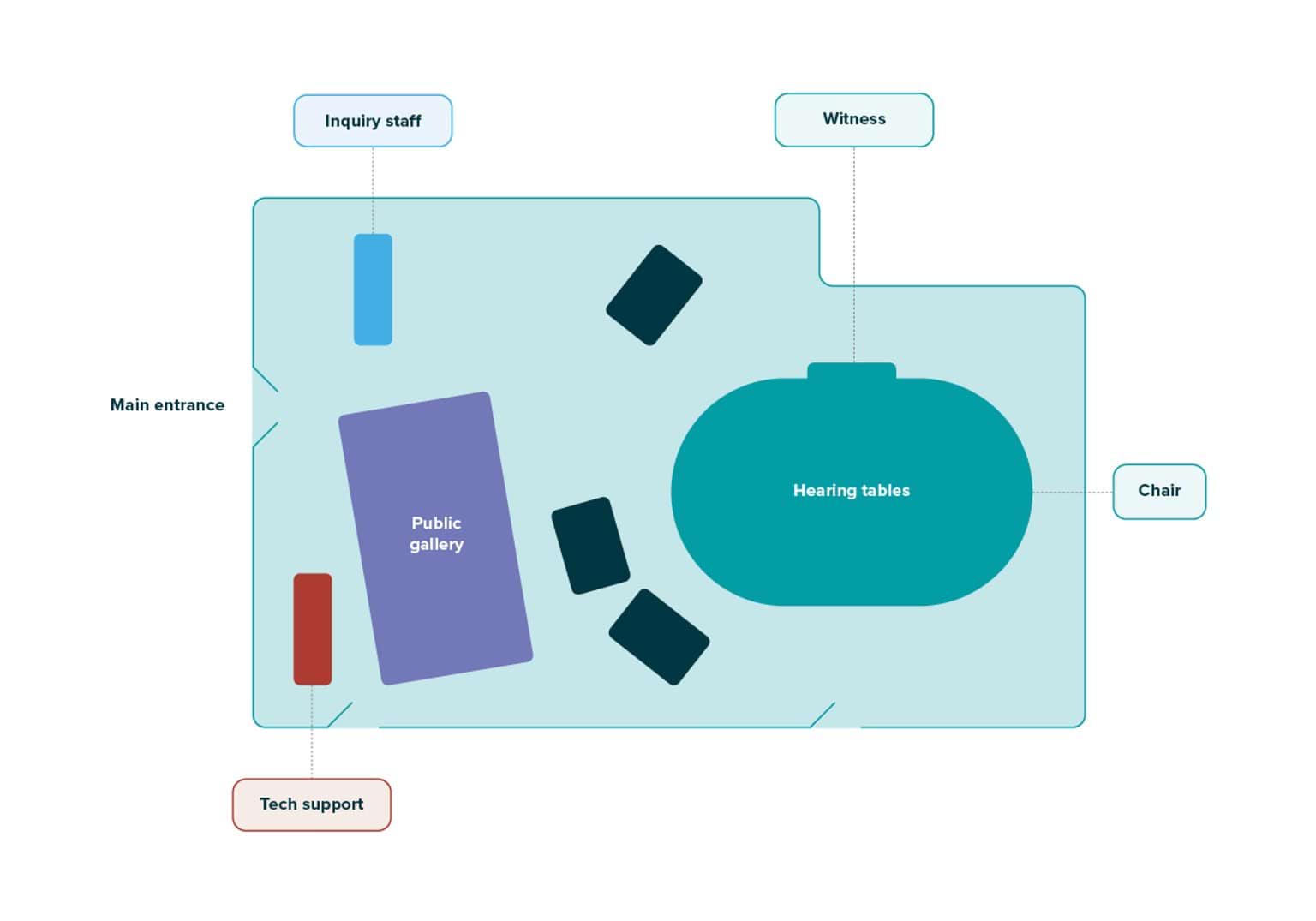Appendix A
Order in Council
Appendix B
Amended Terms of Reference
Appendix C
Glossary
| Term | Definition |
|---|---|
| advocacy | A wide range of activities to promote, protect and defend victim-survivors’ human rights and their rights to services and information. It may involve assisting victim-survivors to express their own needs, access information, understand their options and make informed decisions. |
| alleged perpetrator | The term used in this report to refer to a person who has been accused of committing an act of child sexual abuse, regardless of whether they have been charged or convicted. |
| brief intervention care | A model of defined and time-limited therapeutic intervention that supports victim-survivors and their families, friends and loved ones through the process of sharing their story and re-living the experiences of child sexual abuse. |
| certain other government schools | Victorian government schools where relevant employees of Beaumaris Primary School also worked and allegedly perpetrated child sexual abuse. |
| child | Defined in the Terms of Reference to mean ‘a child within the meaning of the [United Nations] Convention on the Rights of the Child of 20 November 1989’. This definition includes every human being below the age of 18 years unless, under the law applicable to the child, they attain majority earlier. |
| child protection | Defined by the United Nations as ‘above all … protecting [children’s] physical, mental and psychosocial needs to safeguard their futures’. |
| child safety | Defined in the Victorian Child Safe Standards as ‘matters related to protecting all children from child abuse, managing the risk of child abuse, providing support to a child at risk of child abuse and responding to suspicions, incidents, disclosures or allegations of child abuse’. |
| child sexual abuse | Any act that exposes a child to, or involves a child in, sexual processes beyond their understanding or contrary to accepted community standards. Sexually abusive behaviours can include the touching of genitals, masturbation, oral sex, vaginal or anal penetration by a penis, finger or any other object, the touching of breasts, voyeurism, exhibitionism, and exposing the child to or involving the child in child exploitation material. It includes grooming, which is defined below. |
| complaint | The term used in this report to mean any disclosures made to an institution related to child sexual abuse in a government school context. It also includes any allegation, suspicion, concern or report of a breach of an institution’s code of conduct. A complaint may be made about an adult allegedly perpetrating child sexual abuse. A complaint may also be made as a result of observations, including observations of behavioural indicators; for example, a child exhibiting harmful sexual behaviours. An institution may receive a complaint:
A complaint can be made in writing or verbally, and may become a ‘report’ to an external authority or agency. |
| culturally appropriate | A term used to describe an approach to policy, intervention, service delivery and inter-group interaction that is based on the positive acceptance of the cultural values and expectations of a particular cohort. |
| culturally diverse | A term used to describe diversity within a population. In this report, it is used in reference to the diversity of the Victorian population, and to acknowledge that culture and language can influence people’s needs and their access to support services that meet those needs. |
| culturally safe | A term used to describe an environment that is safe for people, where there is no assault against a person, and no challenge to or denial of a person’s identity, who they are and what they need. It is about shared respect, shared meaning, shared knowledge and experience of learning, living and working together with dignity, and truly listening. |
| Department of Education | Defined in the Terms of Reference to mean ‘the Department with primary responsibility for the employment of teachers in government schools at the relevant time, including the current Department of Education’s predecessors over time’. |
| disciplinary offences | May be seen to constitute any act (or omission) involving a breach of discipline under an Act, code of conduct, workplace policy or other regulation. A disciplinary offence is usually concerned with a person’s fitness for employment and, in determining how to punish an individual’s behaviour, non-criminal sanctions may be considered. |
| disclosure | A process by which a child conveys or attempts to convey that they are being or have been sexually abused, or by which an adult conveys or attempts to convey that they were sexually abused as a child. Disclosure may take many forms, and may be verbal or non-verbal. Non-verbal disclosures are more common among young children and children with cognitive or communication impairments. Non-verbal disclosures may include painting or drawing, or gesticulating. Children in particular may disclose sexual abuse through emotional or behavioural changes, such as heightened anxiety, withdrawal or aggression. Disclosures can be intentional or accidental, partial or complete, and they might be prompted by questions from another person or triggered by a memory of child sexual abuse. A disclosure may also become a ‘complaint’ when made to an institution or a ‘report’ when made to an external authority or agency. |
| experience | A person’s account or recollection of their experience of child sexual abuse and the impact of their experience of child sexual abuse. |
| government school | Defined in the Terms of Reference as having ‘the same meaning as “Government school” in the Education Training and Reform Act 2006 but exclud[ing] schools that historically were attached to orphanages and group homes’. |
| grooming | Behaviours that manipulate and control a child, their family, their communities or institutions with the intent of gaining access to the child, obtaining the child’s compliance, maintaining the child’s silence and avoiding discovery of the sexual abuse. |
| historical child sexual abuse | Defined in the Terms of Reference to mean ‘sexual abuse of a child in a government school by a staff member employed by the Department of Education in a government school, where that abuse occurred prior to 31 December 1999’. |
| impact | The physical, emotional, psychological, social and economic consequences that child sexual abuse has had and may continue to have on a person, their family, their friends and the wider community. |
| offender | The term used in this report to refer to a person who has been convicted of committing a criminal offence relating to child sexual abuse. |
| officer | When used in the context of ‘the Department of Education and its officers’ state of knowledge’ in the Terms of Reference, refers to a person employed or engaged in, or appointed to, a position in the Department of Education, whether on an ongoing basis or otherwise, and includes (without limitation) teachers, principals, inspectors, supervisors and lecturers. |
| organisational culture | The assumptions, values, beliefs and norms that distinguish appropriate from inappropriate attitudes and behaviours demonstrated by people within an organisation (for example, teacher and student attitudes and behaviour in a school). |
| prep | The first year of primary school. |
| relevant employee | Defined in the Terms of Reference to mean ‘a teacher or other government school employee or contractor who sexually abused a student at Beaumaris Primary School during the 1960s or 1970s’. The Board of Inquiry found that six individuals fell within the definition of ‘relevant employee’. |
| report (of child sexual abuse) | Where concerns relating to child sexual abuse are notified to an authority or agency external to the relevant institution; for example, where a person or institution notifies the police, a child protection agency, an oversight agency or a professional or registration authority. |
| secondary victim | Defined in the Terms of Reference to mean ‘a person who has been affected by the abuse perpetrated against the primary victim-survivor’. A secondary victim may include partners, children, parents, siblings or extended family. A person who witnessed the child sexual abuse may also be a secondary victim. |
| sexual assault | Any behaviour of a sexual nature that makes someone feel uncomfortable, frightened, intimidated or threatened. It is sexual behaviour that someone has not consented to. It does not always include physical harm. |
| support | Emotional and practical assistance provided to victim-survivors to reduce their feelings of isolation, and promote connections and trusted relationships to aid in healing and recovery. |
| support service | A service that provides advocacy, support or therapeutic treatment. |
| therapeutic treatment | An overarching term covering a range of evidence-informed interventions that address the psychosocial impacts of child sexual abuse. Therapeutic treatments seek to improve victim-survivors’ physical, psychological and emotional wellbeing, and to enhance their quality of life. |
| trauma-informed approach | An approach to work that is centred on the needs of victim-survivors. The approach emphasises psychological, cultural and physical safety, and is underpinned by six internationally recognised principles:
|
| victim-survivor | The term used in this report to refer to a person who identifies as having experienced child sexual abuse. In line with a trauma-informed approach, the Board of Inquiry acknowledges that individuals have the right to define their identity and that some may consider the terms ‘victim’ and ‘survivor’ to exist on a continuum of recovery. The Board of Inquiry also recognises that some people may not identify with either of these terms. |
Appendix D
Acronyms
| Acronym | Full meaning |
|---|---|
| AC | Companion of the Order of Australia |
| ACCO | Aboriginal Community Controlled Organisation |
| ACMS | Australian Child Maltreatment Study |
| ALRC | Australian Law Reform Commission |
| AM | Member of the Order of Australia |
| AO | Officer of the Order of Australia |
| CASA | Centre Against Sexual Assault |
| CPC | Counselling and Psychological Care |
| DFFH | Department of Families, Fairness and Housing |
| DJCS | Department of Justice and Community Safety |
| DPR | Direct Personal Response |
| FOI | Freedom of Information |
| FVRJ | Family Violence Restorative Justice service, Department of Justice and Community Safety |
| KC | King’s Counsel |
| LGBTIQA+ | Lesbian, gay, bisexual, trans and gender diverse, intersex, queer and asexual |
| MP | Member of Parliament |
| NOCS | National Office for Child Safety |
| OAM | Medal of the Order of Australia |
| PAL | Policy Advisory Library, Department of Education |
| PSM | Public Service Medal |
| PROV | Public Records Office Victoria |
| PTSD | Post-traumatic stress disorder |
| RSS | Redress Support Services |
| SAMHSA | Substance Abuse and Mental Health Services Administration |
| SAMSN | Survivors & Mates Support Network |
| SC | Senior Counsel |
| SECASA | South Eastern Centre Against Sexual Assault |
| UNESCO | United Nations Educational, Scientific and Cultural Organization |
| VACCHO | Victorian Aboriginal Community Controlled Health Organisation |
| VAP | Victims Assistance Program, Department of Justice and Community Safety |
| VIT | Victorian Institute of Teaching |
| VLRC | Victorian Law Reform Commission |
| VOCAT | Victims of Crime Assistance Tribunal |
Appendix E
Private sessions
This appendix comprises the guide that was provided to participants who engaged in private sessions with the Board of Inquiry Chair or Counsel Assisting. An explanation of the private session process can be found in Chapter 1, Establishment and approach(opens in a new window).
A guide to your private session
What is a private session?
A private session is a face-to-face or online meeting with a host from the Board of Inquiry where you can tell your story in a private and safe environment.
We will ask for your consent to record audio, so we can create a transcript that will help the work of the inquiry. We will also take notes during your session. You can decide if the information we gather is used anonymously or kept entirely confidential. You may also opt out of having your session audio recorded.
A private session usually runs for up to one hour.
Who will be there?
A private session will usually include the following people in the room:
- yourself
- any support person you bring (in addition to a legal representative)
- the host
- a Board of Inquiry staff member, who will take notes.
Counsellors will be available for you both before and after your private session if you wish to speak with them. Our schedule allows 10 minutes for a check-in before the session, and 45 minutes for a post-session debrief.
Please contact us if you require any further support.
Can I bring a support person?
Yes, you can bring a support person to your private session.
Your support person could be a family member or friend, in addition to your own counsellor or lawyer. They can come into the session or wait for you in a room close by.
If you decide to bring a support person into the room, their role will be to support you while you share your experiences with the host.
What do I need to prepare?
Before you attend your private session, it can help to prepare and think through what you would like to talk about. It can also be helpful to think about what you do not want to talk about. The host may ask questions to prompt you to share your story, but you are not obligated to answer or speak about anything you do not want to discuss.
You might like to think about:
- what happened
- if and how you reported the abuse
- what the response to your report was
- whether you accessed any support services
- what has helped with your healing or would help you with it now.
How can I share information with the Board of Inquiry?
You can choose to share information with the Board of Inquiry on the basis that it may be:
- Public — The information shared may be published, including the name of the individual, group or organisation.
- Anonymous — You can request to provide information anonymously or using a pseudonym (a made-up name). The Board of Inquiry will keep a record of your identity, but it will not name or identify you as being the source of any information that it decides to make public (including in its report).
- Confidential — You can request to provide some or all of your information confidentially. While your information will generally inform the Board of Inquiry’s work, the Board of Inquiry will not publish or quote the confidential information (including in its report). The Board of Inquiry may still be required to disclose confidential information if it is required to do so by law.
Can I bring documents with me?
Yes. If you have documents you would like to share with us, they can be provided prior to your session via email or you can bring them on the day.
Examples of supporting documents are:
- police statements
- letters
- school reports
- photographs.
If the documents are originals, copies will be made and the originals will be returned to you on the day of your private session. Electronic documents can be emailed to contact@beaumarisinquiry.vic.gov.au
If you wish to speak to any lawyer you might have before bringing documents, you are welcome to do so. You also do not need to give us the documents on the day if you do not wish to do so. You are welcome to attend the session and decide afterwards if there are any documents you wish to provide.
Information about your private session
Where can I find details about my private session?
Please refer to the email that was sent to you titled ‘Private session confirmation’ for the date, time and location of your session. If you are unable to find the email or have further questions, please contact us via phone on (03) 8301 0102 or email contact@beaumarisinquiry.vic.gov.au.
Private session rooms
Private sessions are held in a small room around an oval-shaped table. The room is intended to make you feel safe and comfortable as you share your story.
What support is available to help me attend my private session?
If you need any financial assistance to travel to your private session, or for any other related expenses, please do not hesitate to contact us.
What will happen when I arrive?
When you arrive, walk down the brick pathway and enter the elevator lobby through the main entrance. Take an elevator up to Level 9, and when you exit a Board of Inquiry staff member will be waiting to greet you.
Water, tea and coffee will be available for you.
Contact us
If you have any questions at all about attending your private session or wish to discuss your specific needs, please contact us via phone on (03) 8301 0102 or by email on contact@beaumarisinquiry.vic.gov.au.
For more information about the inquiry, please visit our website: beaumarisinquiry.vic.gov.au
Appendix F
Submissions
The Board of Inquiry was open to receiving submissions from individuals and organisations encompassing all experiences, views and ideas within the scope of its Terms of Reference.
This appendix contains details of the submission process. This guidance was available on the Board of Inquiry’s website to assist individuals and organisations in developing their submissions.
This appendix also contains the names of people who made public submissions, as well as a list of those professionals and organisations that made public submissions within scope of the inquiry. The Board of Inquiry is grateful to those who provided submissions, and acknowledges their generosity in sharing their experiences, knowledge and expertise. More information about submissions received by the Board of Inquiry can be found in Chapter 1, Establishment and approach.
Submission process
Submissions could be any length and shared in any format, such as online, via mail, or in audio or audio-visual formats. For those uncertain about whether to share their experiences, they were guided to contact the Board of Inquiry.
Submissions could be made on a public, anonymous or confidential basis:
- Public submissions could be published or referred to in the Board of Inquiry’s work.
- Anonymous submissions could be published or referred to in the Board of Inquiry’s work but with all identifying information removed.
- Confidential submissions would inform the Board of Inquiry’s work but would not be published or referred to publicly in the Board of Inquiry’s work (even in a de-identified way).
Questions were provided on the Board of Inquiry’s website to guide the development of the submissions, but those making submissions were not required to answer all or any of the questions. The questions were:
- What is your experience of child sexual abuse between the 1960s and 1970s by a teacher, employee or contractor of Beaumaris Primary School, or by a teacher, employee or contractor connected to Beaumaris Primary School (for example, because they previously worked at Beaumaris Primary School)?
- If you are uncertain about whether to share your experience with the inquiry, please contact the inquiry via telephone on (03) 8301 0182 or via email at contact@beaumarisinquiry.vic.gov.au.
- Was the abuse reported to the school, the Department of Education, an officer of the Department, or any other authority, at the time, or in subsequent years? If the abuse was reported, what was the response and what did you think or feel about the response?
- How has the abuse affected your life and the life of your family, friends, loved ones and other supporters?
- Do you have any experience with, or ideas about, appropriate ways to support healing (in particular, ways to support those who disclose child sexual abuse as an adult)?
- Do you think support services for adult victim-survivors of child sexual abuse in government schools are effective? Please explain your response.
- Please share anything else about your experience you would like the inquiry to know and that is relevant to the inquiry’s Terms of Reference.
You may wish to comment on findings and recommendations relevant to this inquiry’s Terms of Reference; the implementation of relevant recommendations; what impact previous related inquiries have had on child safety in Victoria; or what impact they have had on you.
Submissions received
Several submissions were received from victim-survivors, secondary victims, affected community members and members of the public. Those who indicated a preference for their submissions to be made public were Kym Marriot, Matthew Grey, Simon McGarvie, Lucy Cuzzupe, David Henthorn, Lionel Mrocki and David ‘Macca’ McCarthy.
The Board of Inquiry also received submissions from a range of professionals and organisations. Submissions were received from Bravehearts, Sexual Assault Services Victoria, Angela Sdrinis Legal, In Good Faith Foundation, LOUD fence Inc and Maurice Blackburn Lawyers. Where appropriate, these submissions were published on the Board of Inquiry’s website (noting that some professionals and organisations requested that their submissions, or elements of their submissions, be kept anonymous or confidential).
Appendix G
Appendix G
Information about public hearings
The Board of Inquiry held seven days of public hearings, inviting a range of people to participate. Some gave oral evidence, some provided a witness statement, and some did both.
This appendix comprises:
- the public hearings timetable, which lists the dates, witnesses who appeared, and topics
- a list of individuals who provided witness statements or written narratives of their experiences
- the guide to public hearings provided to victim-survivors and secondary victims who appeared as witnesses giving oral evidence, or for whom a narrative was read out by Counsel Assisting.
The Board of Inquiry is grateful to those who gave oral evidence, provided witness statements or allowed their narratives to be read out by Counsel Assisting, and acknowledges their generosity in sharing their experiences. An explanation of the public hearings process and approach to witness statements can be found in Chapter 1, Establishment and approach(opens in a new window).
Public hearings
The following table lists hearing dates, witnesses and topics for the Board of Inquiry’s hearings.
| Date | Witness | Topic |
|---|---|---|
| 23 October 2023 | Tim Courtney, victim-survivor | Experience Focus on understanding the effects of historical child sexual abuse in government schools, and the individual and shared experiences of victim-survivors, secondary victims and affected community members |
| 24 October 2023 | ‘Bernard’ (a pseudonym),victim-survivor Dr Katie Wright, Associate Professor, Department of Social Inquiry, La Trobe University Professor Leah Bromfield, Director of the Australian Centre for Child Protection and Chair of Child Protection, University of South Australia (remote) | |
| 15 November 2023 | Dr David Howes PSM, Deputy Secretary, Schools and Regional Services, Department of Education | Accountability Focus on the accountability of the Department of Education in relation to the allegations of historical child sexual abuse in government schools |
| 16 November 2023 | Dr Howes (continued) Professor Patrick O’Leary, Co-Lead, Disrupting Violence Beacon and Director of Violence Research and Prevention, Griffith University Criminology Institute and School of Health Sciences and Social Work | |
| 17 November 2023 | Jenny Atta PSM, Secretary, Department of Education | |
| 23 November 2023 | Government panel:
Dr Rob Gordon OAM, Clinical Psychologist | Support services and healing Focus on support services and healing through the evidence of a range of witnesses from government agencies and community organisations, as well as relevant experts, and the experiences of victim-survivors |
| 24 November 2023 | Maureen Hatcher, Founder, LOUD fence Inc Adrian Farrer, Principal, Trinity Grammar School, Kew, Victoria Bruce Esplin AM, former Victorian Emergency Management Commissioner and former Chair of Regional Arts Victoria |
Witness statements and narratives
In addition to the witnesses who appeared during the public hearings, the Board of Inquiry also relied on witness statements from experts and written narratives from victim-survivors and secondary victims. People who provided a witness statement or for whom a narrative was read out during the public hearings are listed below.
| Witness statement | Narrative |
|---|---|
Professor Lisa Featherstone, Head of School, School of Historical and Philosophical Inquiry, University of Queensland Professor Daryl Higgins, Director, Institute of Child Protection Studies, Australian Catholic University Professor Michael Salter, Professor of Criminology, School of Social Sciences, University of New South Wales Dr Joe Tucci, CEO, Australian Childhood Foundation | ‘Casey’ (a pseudonym) ‘Dennis’ (a pseudonym) ‘Samuel’ (a pseudonym) ‘Paula’ (a pseudonym) ‘Hank’ (a pseudonym) ‘Christie’ (a pseudonym) Grant Holland |
A guide to public hearings for victim-survivor participants
This guide is to support victim-survivors, secondary victims and affected community members who are attending a public hearing.
Overview
What is a public hearing?
Public hearings are formal proceedings where witnesses give evidence under oath or affirmation about the events and issues that are relevant to the Board of Inquiry’s Terms of Reference.
The Board of Inquiry into historical child sexual abuse in Beaumaris Primary School and certain other government schools (the inquiry) is holding a series of public hearings in Melbourne. The focus of the public hearings will be in relation to the inquiry’s Terms of Reference, including:
- the experiences of victim-survivors of historical child sexual abuse who were abused by relevant employees at Beaumaris Primary school and other government schools
- the response of the Department of Education in relation to the historical child sexual abuse
- the appropriate ways to support healing for victim-survivors, secondary victims and affected community members
- whether there are effective support services for victim-survivors of historical child sexual abuse in government schools.
All public hearings will be streamed on the inquiry’s website.
Who will be there?
At a public hearing, the following people will be in the room:
- the Chair, Kathleen Foley SC
- Counsel Assisting, Fiona Ryan SC and/or Kate Stowell
- members of the inquiry’s Legal team
- witnesses and their legal representative(s)
- inquiry staff members, including members of the Support team
- the media
- members of the public.
Where can I find details about the public hearings?
Details about the public hearings, including daily schedules, will be available on the inquiry’s website: beaumarisinquiry.vic.gov.au(opens in a new window).
If you are unable to find these details or have further questions, please contact us via phone on (03) 8301 0102 or by email at contact@beaumarisinquiry.vic.gov.au.
Attending a public hearing
Location
The inquiry is holding its public hearings at Level 9, 54 Wellington Street, Collingwood. More information about the location appears later in this document.
What will happen when I arrive?
When you arrive at 54 Wellington St, walk down the brick pathway and enter the elevator lobby through the main entrance. Press the keypad to call the lift to take you to Level 9. On exiting the lift, turn left towards reception, where a Board of Inquiry staff member will be waiting to greet you.
Tea and coffee facilities will be available, and toilets are also available on Level 9.
Areas in the hearing room include:
- hearing tables — where the witness, the Chair of the Board of Inquiry, and legal personnel including Counsel Assisting will be seated
- the public gallery, with seating for up to 40 people
- separate desks or working areas for inquiry staff, legal personnel, media and technical support.
Giving evidence at a public hearing
Witnesses
People who give evidence at a hearing are called witnesses. The Chair and Counsel Assisting will determine who is to be called as a witness at a public hearing, the questions the witness will be asked and the order in which those witnesses are called and examined.
Witnesses may be identified by Counsel Assisting from public submissions, consultations, private sessions, other Board of Inquiry research activities and submissions made by people or organisations granted leave to appear.
If you have been called to appear as a witness, you will be contacted by the inquiry’s Legal team in advance of the public hearing. The Legal team will be your primary point of contact, and this team will guide you through your public hearing appearance.
Witness statements
The Board of Inquiry may require witnesses to complete a witness statement. These statements may be read aloud during the public hearing on behalf of the witness by Counsel Assisting. They may also form the basis of any questions Counsel Assisting puts to the witness.
The witness may be assisted to complete a statement by their legal representative or, if they are not legally represented, the witness may be assisted by Counsel Assisting to prepare their witness statement.
Quotes
During a public hearing, Counsel Assisting may read aloud quotes from victim-survivors, secondary victims or affected community members provided during private sessions or as part of a submission to the Board of Inquiry. The identity of the author of these quotes may be restricted at the request of the author.
Can I bring a support person?
Yes, you can bring a support person to the public hearings.
Your support person could be a family member or friend, as well as your own counsellor or lawyer. They can come into the public hearing room or wait for you in a room close by.
Counselling and support for victim-survivors and secondary victims
The inquiry has a team of counsellors who can provide support to victim-survivors and their family or other support people ahead of, during and after a public hearing.
Pre-hearing support
Prior to a public hearing, our support team will be connecting with victim-survivors or secondary victims who are already engaged with the Board of Inquiry.
The support team will be available to assist victim-survivors or secondary victims who have previously not had counselling.
For victim-survivors and secondary victims who have previously declined the offer of support, the support team will be available to assist if they wish to re-engage.
On-the-day support
The support team will also attend all public hearings to provide counselling and support to witnesses and attendees on the day.
There will be several private rooms available for discreet conversations with members of the support team. If you require support on the day, please speak to a member of the Board of Inquiry team.
Please contact us if you require any further support on (03) 8301 0102
or email contact@beaumarisinquiry.vic.gov.au.
What happens after I have given evidence?
Once you have given your evidence, you are welcome to re-join your family or supporters in the public gallery. If you wish to speak with a member of our support team, they will be available to conduct a debrief session in one of the nearby rooms.
A few days after your appearance at a public hearing, a member of the support team will conduct a post-appearance check-in to see if you would like any additional supports.
If you do not wish to stay for the remainder of the public hearing, you are free to leave.
Appendix H
Roundtables
In late November and early December 2023, the Board of Inquiry hosted five roundtables to gather additional information after the public hearings. A roundtable is an organised discussion between a moderator and several participants who bring a variety of perspectives to a specific topic.
This appendix provides details of the roundtables, including the list of attendees for each.
The Board of Inquiry is grateful to those who participated in the roundtables, and acknowledges their generosity in sharing their knowledge and expertise. Information about how roundtables were conducted can be found in Chapter 1, Establishment and approach.
Roundtable 1: Support Service
Date | Location | Attendees |
29 November 2023 | Online | Amanda Paton, Deputy Director of Practice, Australian Centre for Child Protection, University of South Australia
Helen Consta, Manager of Trauma Services and New Initiatives, Windermere
Clare Leaney, CEO, In Good Faith Foundation
Allison Wainwright, CEO, Family Life
Victoria McIntyre, Community Counselling Team Leader, Western Region Centre Against Sexual Assault |
Roundtable 2: Healing
Date | Location | Attendees |
29 November 2023 | Online | Carol Ronken, Director of Research, Bravehearts
Craig Hughes-Cashmore, CEO, Survivors and Mates Support Network
Fiona Cornforth, inaugural head, National Centre for Aboriginal and Torres Strait Islander Wellbeing Research, Australian National University
Dr Gary Foster, founder, Living Well, and former Practice Manager, Queensland Department of Child Safety, Youth and Women
John Crowley, former school principal, St Patrick’s College Ballarat, and PhD candidate, La Trobe University |
Roundtable 3: Lived Experience Perspectives
Date | Location | Attendees |
1 December 2023 | Hybrid — online and in person | Seven people attended the roundtable, representing the experiences of victim-survivors and secondary victims |
Roundtable 4: Support Services
Date | Location | Attendees |
1 December 2023 | Online | Jane Barr, CEO, Gippsland Centre Against Sexual Assault
Cameron Boyd, Coordinator, Counselling and Redress Support Service, Open Place, Relationships Australia Victoria
Meaghan Courtney, General Manager, Quality and Review, and Manager of the Heritage Services Team, Anglicare Victoria
Professor Daryl Higgins, Director, Institute of Child Protection Studies, Australian Catholic University
Kathleen Maltzahn, CEO, Sexual Assault Services Victoria
Amanda Whelan, Director of Client Services, knowmore legal services
Caroline Whitehouse, Manager, Northern Centre Against Sexual Assault |
Roundtable 5: Government
Date | Location | Attendees |
14 December 2023 | In person | Deputy Secretary, People and Executive Services, Department of Education
Director, Knowledge, Privacy and Records, Department of Education
Director, Survivors Inquiry Unit, Department of Education
Executive Director, Program and Service Development, Family Safety Victoria, Department of Families, Fairness and Housing
Executive Director, Family Services, Evidence and Quality Improvement, Department of Families, Fairness and Housing
Director, Victim Support, Department of Justice and Community Safety
Superintendent, Serious Crime Division, Crime Command, Victoria Police |
Appendix I
Consultations
As discussed in Chapter 1, Establishment and approach, the Board of Inquiry engaged directly with several individuals and organisations through a series of targeted consultation meetings.
Those who participated in these targeted meetings were generous in sharing their knowledge and expertise with the Board of Inquiry.
Individuals
- Associate Professor Joanne Evans is an archival and record-keeping researcher and educator in the Department of Human-Centred Computing, in the Faculty of Information Technology at Monash University. Associate Professor Evans established the Archives and the Rights of the Child Research Program, which supports projects focused on improving record-keeping and access to information for people who lived in out-of-home care as children.
- Associate Professor Graham Gee is an Aboriginal clinical psychologist and is employed at the Murdoch Children’s Research Institute. Associate Professor Gee has 15 years' experience working in the Aboriginal community-controlled health sector. He currently provides supervision and leads research with a focus on supporting the workforce and victim-survivors of child sexual abuse.
- Dr Cate O’Neill is the National Editor and Research Coordinator of the Find & Connect web resource and Kirsten Wright is the Program Manager of Find & Connect. Both Dr O’Neill and Ms Wright are based in the Faculty of Arts at the University of Melbourne. Find & Connect brings together historical resources relating to institutional care in Australia, including information about children’s homes. It helps individuals to find personal records, and provides information on support groups and services.
Organisations
- The Blue Knot Foundation provides advocacy and support for people who have experienced complex trauma. The Board of Inquiry consulted with Blue Knot due to its leadership and expertise in the field of complex trauma and its extensive work with victim-survivors of child sexual abuse. The Board of Inquiry engaged with Dr Cathy Kezelman AM, the President and Executive Director of Blue Knot.
- The Centre for Innovative Justice was consulted with regard to its research that seeks to expand the capacity of the justice system to meet and adapt to the needs of its diverse users, with a primary focus on restorative justice. The Board of Inquiry engaged with Stan Winford, Associate Director, Centre for Innovative Justice and Renee Handsaker, Open Circle Practice Lead.
- The Heal For Life Foundation was consulted to discuss victim-survivors’ healing. Heal for Life delivers peer-led programs to support survivors heal from childhood trauma, as well as providing training for therapists in trauma-informed practice. The Board of Inquiry engaged with Liz Mullinar, who is a survivor of childhood trauma and abuse, and the founder of Heal for Life.
- The Social Research Centre and the Australian Catholic University were consulted to discuss their development of the Evaluation Framework for the Royal Commission into Institutional Responses to Child Sexual Abuse, which sought to evaluate the implementation of the Royal Commission’s recommendations, 10 years after the Royal Commission’s conclusion. The Board of Inquiry engaged with Sue Khor, the then Director of Evaluation at the Social Research Centre, Pam Muth, the then Executive Director at the Social Research Centre, and Professor Daryl Higgins, Director, Institute of Child Protection Studies at the Australian Catholic University.
- The Board of Inquiry consulted with staff of the Victorian Aboriginal Health Service to learn more about how they run the Garra Kombrook Cultural Healing Program for Aboriginal people who have experienced sexual abuse or assault. The Victorian Aboriginal Health Service provides medical, dental and a range of social services to Victorian Aboriginal communities, and is one of four Aboriginal Community Controlled Organisations funded by the Victorian Government to provide Aboriginal community-led sexual assault support services.
Appendix J
Department of Education apology
On 17 November 2023, Jenny Atta PSM, Secretary, Department of Education, appeared before the Board of Inquiry into historical child sexual abuse in Beaumaris Primary School and certain other government schools. During this appearance, Ms Atta provided an apology to victim-survivors of historical child sexual abuse at Beaumaris Primary School and other schools within the Board of Inquiry’s scope. This apology is available on the Victorian Government website and is reproduced below.
Apology
I want to say on behalf of the Department, to victim-survivors of child sexual abuse in Victoria’s government schools, that I am profoundly sorry for the shocking abuse and injury inflicted on you.
Abuse and injury that should never have occurred anywhere, but especially in a place where you were not only entitled to feel safe, but where you should have been safest.
I understand, and acknowledge, that harm is not just caused by the abuser, but harm is also caused, and is compounded, by a lack of an appropriate response by those in authority. I acknowledge and deeply regret the catastrophic failings of the government school system and the Department of Education over the period of time being examined by this Board of Inquiry.
Our schools and the Department failed to protect you at a time when you were most vulnerable, when you were a child. I acknowledge this without qualification and genuinely believe that institutions, particularly public institutions, must own and be accountable for their history.
I have heard how many victim-survivors felt unable to disclose their abuse. The education system did not arm them, as children, with the knowledge to know the abuse was wrong, or the language or processes to assist them in disclosing. It did not arm teachers with the skills to recognise the signs to identify and intervene to prevent further abuse. For those children who disclosed to an adult, they were often not believed. If they were believed, the response was woefully inadequate or inappropriate. The response left the victims and those seeking to protect them powerless, and enabled the abuse of children to continue and spread.
The failings of the system are many. They include the following.
- There were no policies or processes to prevent abuse or guidance on how to respond to allegations when they were made.
- There was no training of teachers to be able to identify the warning signs of child sexual abuse.
- While there were processes that could have been used to remove the perpetrator from the teaching service, those processes were not/rarely used.
- Teachers were able to remain in their role or transfer to other schools and continue the abuse.
It is utterly unacceptable that a child should suffer sexual abuse while they are under the care and supervision of a Victorian government school.
In relation to Beaumaris Primary School, and other schools examined through this inquiry, I want to say that it is profoundly troubling that multiple students were sexually abused at a similar time.
These were not one-off incidents. Between the Department’s records and those of Victoria Police, we now know of at least 44 victim-survivors of four perpetrators across multiple schools. I understand that more have come forward to this Board of Inquiry and there are likely to be more still. Some will have lived their whole lives in silence, dealing with the trauma of what happened to them on their own.
I am deeply sorry for the psychological trauma and injury suffered by former students of our schools as a consequence of this abuse, and the deep impact and harm that this has caused victim-survivors throughout their lives.
I want to acknowledge the far-reaching impacts of this abuse on parents, spouses, partners, children and other family members, which is significant, enduring and often unacknowledged.
And I recognise the strength and courage of the victim-survivors who have come forward to advocate on behalf of other victim-survivors, and the bravery and resilience required of any
victim-survivor to come forward.
And finally, in making these acknowledgements and offering my genuine apology on behalf of the Department of Education, I am acutely conscious of the calls from victim-survivors for not only apology, but for a commitment to action. I am aware of the evidence already before this Board of Inquiry that goes to this point, that without a commitment and follow-through on a course of action, there is risk of further harm, and an ongoing loss of trust.
There have been many changes to prevent the abuse of children in schools, to ensure child safety is a priority. We have taken steps not only to change the way in which we respond to allegations of abuse, but also to prevent it from happening in the first place. I hope to be able to talk about some of those today.
As Secretary of the Department of Education I genuinely welcome the establishment of this Board of Inquiry. On behalf of the Department, I commit to fully engaging with the findings, conclusions and recommendations so that they can inform tangible steps and actions for the Department, and across government, to ensure that there are effective supports and services available to victims of historical sexual abuse in government schools — and to inform our continued work to ensure that the safety of children in our schools is our highest priority.


